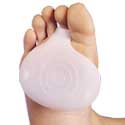Freiberg's Infraction
INTRODUCTION
Freiberg's Infraction is a condition specific to the lesser metatarsal heads, most commonly the second metatarsal. Also known as avascular necrosis, or AVN, this condition results in a focal loss of blood supply to the metatarsal head. Freiberg's Infraction occurs at the metaphysis of the bone in a region where the primary or nutrient artery of the bone supplies the distal metatarsal. The result is a collapse of the metatarsal head.
SYMPTOMS
- Pain and swelling localized to the metatarsal head are the most specific symptoms. Pain may be increased with weight bearing and typically becomes worse with the duration of time spent on the feet. Patients may have only pinpoint tenderness or may have difficulty walking.
- Patients typically present with pain, stiffness, and a limp. History of trauma may or may not exist. The pain often is vague, related to activity, and poorly localized to the forefoot. Patients may describe a chronic history of forefoot pain with episodic exacerbation or a sudden onset of pain related to a specific injury.

CAUSES
- Probably results from stress or injury of the foot.
- Risk increases with certain factors:
- Overzealous conditioning routines, such as running, jumping or jogging.
- Overweight.
- Male between 11 and 18.
- Rapid skeletal growth.
- The exact nature of the cause of Freiberg disease is unknown. It most likely is multi factorial, including vascular and traumatic injuries. Certain patients may be anatomically predisposed based on local mechanical, vascular, and developmental factors. Whether or not the process is the same for older patients as it is for adolescents is unknown. The relative infrequency of the disease, as well as the variable presentation regarding age and injury, makes the study of various causes challenging. In the future, genetic or other variables that play a role in the development of Freiberg disease may be identified. Further investigation is needed.
WHAT YOU SHOULD DO
- Help an overweight child lose weight.
- Encourage your child to exercise moderately, avoiding extremes.
WHAT YOU SHOULD NOT DO
- Ignore the pain. You can not grow out of this disease!
WHAT THE CHIROPODIST/ FAMILY DOCTOR WILL DO
Treatment tends to vary based upon the level of collapse. Treatment should include support with padding or orthotics. Casting may be used in the early levels to decrease the tendency of the distal bone to collapse. Steroid injections may help to relieve pain and reduce inflammation of the joint capsule. Sometimes simple rest for 1-4 months with no sporting activity may be adequate for a teenager to be treated of this condition.
Surgical correction may include simple debridement of the joint with revision of the cartilage. Tip-up osteotomies of the metatarsal are used to deflect the eroded cartilage away from the joint space bringing new cartilage from the bottom of the joint into the central aspect of the joint. Joint implants have also been used with marginal success.
The long term success of the treatment of Freiberg's Infraction varies. Active patients, such as athletes tend to have greater residual disability.


















